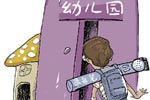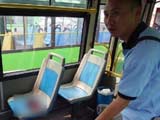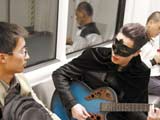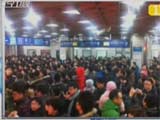Part ⅠWriting (30 minutes)
Directions: For this part, you are allowed 30 minutes to write a short essay entitled Is It Appropriate for College Students to Rent Apartments Outside Campus? You should write at least 150 words following the outline given below:
1. 简单说明目前大学生在外租房情况
2. 对这种情况进行利弊分析
3. 根据利弊分析得出结论,表明观点
Is It Appropriate for College Students to Rent Apartments Outside Campus
________________________________________________________________________________________________________________________________________________________________________________________________________________________________________________________________________________________________________________________________________________________________________________________________________________________________________________________________________________________________________________________________________________________________________________________________________________________________________________________________________________________________________________________________________________________________________________________________________________________________________________
Part ⅡReading Comprehension (15 minutes)
Directions: In this part, you will have 15 minutes to go over the passage quickly and answer the questions on Answer Sheet 1.
For questions 1-4,mark
Y(for YES)if the statement agrees with the information given in the passage;
N(for NO)if the statement contradicts the information given in the passage;
NG(for NOT GIVEN)if the information is not given in the passage.
For questions 5-10,complete the sentences with the information given in the passage.
Reading for Life
Today is the first day of the rest of your life. How can reading fill it to overflowing with adventure, richness, and fullness?
Your Pleasure-giving Skill
Skills are skills. Pleasures are pleasures. But some skills are lasting pleasures. Such is reading. Listen to Hazilitt---"The greatest pleasure in life is that of reading." Or Macauly--- "I would rather be a poor man in a garret with plenty of books than a king who did not love reading." To them and countless others all over the world, reading is a source of the deepest and fullest enjoyment. That's true from early school days to days of leisure and retirement.
Your Fountain of Youth
Reading is more than that. It can be your fountain of youth. Virginia Woolf said, "The true reader is essentially young." One of your major problems is how to stay alive as long as you live. Some die at 30 but are not buried until they're 70. With some, youth slips away before being properly savored. Reading provides a spring of living water, refreshing and life-giving. Stay young for life with reading.
Your Dream-fulfillment Aid
Part of youth lies in dreaming---dreaming impossible dreams that you can sometimes make possible. Robert F. Kennedy said this, “Some men see things as they are and say ‘Why?' I dream things that never were and say ‘Why not?'" Certain books push the boundaries of the human mind out beyond belief. After all, a little bit of greatness hides in everyone. Let books bring it into full bloom.
Your Know-thyself Aid
What's your most important quest? Finding yourself. Finding your own identity. The Greeks epitomized that problem in two words: Know yourself. Well, articles and books help in that all-important search. They supply assurance of the power and worth of your own life, a measure of your possibilities.
To see yourself in proper perspective, you need detailed picture of real people in real situations. We need to see three-dimensional characters, with all the typical human fears and limitations. Then, and only then, can you begin to see and know yourself as you should.
Your Vocational Counselor and Consultant
What about practical questions, such as those about your vocation? Will reading help you decide more intelligently what to do, how to prepare yourself and how to succeed on the job?
To answer the first question, you have to know your own talents, abilities, and interests well. You must also, however, know the opportunities in the world around you. Some Bureau of Labor Statistics, for example, predicted a surplus of approximately two million school teachers. Still another source indicated that right now "the health fields are the only fields in which we have shortages." Balance such information with self-knowledge and you have some of the ingredients needed to make intelligent, perceptive choices.
Second, you've decided on a career. How and where do you get the required preparation? Again, turn to reading. You'll probably find a listing of school programs to choose from. You may even find them rated. If so, you'll know exactly where to go for the best possible preparation.
Third, don't stop yet. You've selected a career and trained yourself. Learn on reading now to help you succeed on the job. A variety of magazines and books will provide guidance and help.
But that's not all. The day of only one lifetime career may be almost over. All too often, change throws hundreds out of work. Change hits the aircraft industry, for example. Result? Hundreds of well-qualified engineers suddenly out on the street.
If you manage things well, keeping a close eye on changing conditions. You can avoid the pain of waking up to find yourself out of a job. Through reading develop some new skills and interests. Then if conditions change, you can slip with comparative ease from one field into another, hardly breaking stride.
Most of the things taught in school-typing, shorthand, key punching, language, farming, business management-are readily available in interesting self-help articles and books. Let them smooth your path in any new direction you decide to take.
Your Experience Extender
What's the best teacher? Experience, of course! It's priceless. It comes from what you yourself have seen, heard, tasted, smelled, and felt --- what you yourself have lived through.
Take a closer look. Look at our limitations. No wonder experience is so precious. We can't begin to get enough of it. We can't even experience again what we just lived through. We're not born with instant replay. We can't actually relive any moment. And, obviously, we're limited to one lifetime.
Space and time! How they limit us. Who has a time machine to carry him back into history? No one. It's the same with space. We can't literally be in two places at the same time. Right now you can't be sitting where you are and at the same time be strolling down the famed Champs Elysees in Paris.
Here's where reading fits. It can bring us almost unlimited additional experience. To be sure, it's secondhand experience. But it's often so vivid that it seems firsthand, just as if we're living through it ourselves, being moved to tears, laughter, or suspense. That rich range of experience provides the ideal supplement to our own limited experience. In this way, reading becomes one of our most profound mind-shaping activities.
Furthermore, all this experience is available when we want it. Books never impose on us. When we want them, we reach out and pull them off the shelf or table. At our convenience we invite them to share their unbelievable wealth with us.
Carlyle sums this all up nicely, "All that mankind has done, thought, gained, or been; it is lying as in magic preservation in the pages of books." Help yourself! Make reading your experience-extender for the rest of your life.
1. According to the passage, reading is the lasting pleasure.
2. Reading provides all the people in the world with a source of deepest and fullest enjoyment.
3. Reading is a fountain of youth in that one can always learn something new from books and never cease to be young in spirit.
4. The passage explains how books help fulfill your long-cherished dreams.
5. To find your own identity simply means__________________.
6. To make an intelligent decision on what to do, you should have an adequate knowledge of your own _________________________.
7. According to the author, reading is even ________________ after you have selected a career and trained yourself.
8. You should develop some new skills and interests with the help of books in order to prepare for _____________________.
9. Though our experience is limited by __________________, reading can bring us unlimited additional secondhand experience.
10. Carlyle calls on people to make reading their _________ for the rest of their life.
Part II Listening Comprehension (35minutes)
Section A
Directions: In this section, you will hear 8 short conversations and 2 long conversations. At the end of each conversation, one or more questions will be asked about what was said. Both the conversation and the questions will be spoken only once. After each question there will be a pause. During the pause, you must read the four choices marked A), B), C) and D), and decide which the best answer is. Then mark the correspond in letter on Answer Sheet 2 with a single line through the centre.
注意:此部分试题请在答题卡2上作答。
11. A) She will give him the receipt later.
B) The man should make his own copies.
C) She has not got the man's copies ready.
D) The man forgot to make the copies for her.
12. A) She phoned Fred about the book.
B) She was late for the appointment.
C) She ran into Fred on her way here.
D) She often keeps other people waiting.
13. A) Mark is not fit to take charge of the Student Union.
B) Mark is the best candidate for the post of chairman.
C) It won't be easy for Mark to win the election.
D) Females are more competitive than males in elections.
14. A) It failed to arrive at its destination in time.
B) It got seriously damaged on the way.
C) It got lost at the airport in Paris.
D) It was left behind in the hotel.
15. A) Just make use of whatever information is available.
B) Put more effort into preparing for the presentation.
C) Find more relevant information for their work.
D) Simply raise the issue in their presentation.
16. A) the man has decided to choose Language Studies as his major.
B) The woman isn't interested in the psychology of language.
C) The man is still trying to sign up for the course he is interested in.
D) The woman isn't qualified to take the course the man mentioned.
17. A) They are both to blame.
B) They are both easy to please.
C) They can manage to get along.
D) They will make peace in time.
18. A) They are in desperate need of financial assistance.
B) They hope to do miracles with limited resources.
C) They want to borrow a huge sum from the bank.
D) They plan to buy out their business partners.
Questions 19 to 22 are based on the conversation you have just heard.
19. A) We simply cannot help reacting instinctively that way.
B) We wish to hide our indifference to their misfortune.
C) We derive some humorous satisfaction from their misfortune.
D) We think it serves them right for being mean to other people.
20. A) They want to show their genuine sympathy.
B) They have had similar personal experiences.
C) They don't know how to cope with the situation.
D) They don't want to reveal their own frustration.
21. A) They themselves would like to do it but don't dare to.
B) Its an opportunity for relieving their tension.
C) it’s a rare chance for them to see the boss lose face.
D) They have seen this many times in old films.
22. A) to irritate them. B) To teach them a lesson.
C) To relieve her feelings. D) To show her courage.
Questions 23 to 25 are based on the conversation you have just heard.
23. A) Smuggling drugs into Hong Kong.
B) Having committed armed robbery.
C) Stealing a fellow passenger's bag.
D) Bringing a handgun into Hong Kong.
24. A) He said not a single word during the entire flight.
B) He took away Kumar's baggage while he was asleep.
C) He was travelling on a scholarship from Delhi University.
D) He is suspected of having slipped something in Kumar's bag.
25. A) Give him a lift. B) Find Alfred Foster.
C) Check the passenger list. D) Search all suspicious cars.
Section B
Directions: In this section, you will hear 3 short passages. At the end of each passage, you will hear some questions. Both the passage and the questions will be spoken only once. After you hear a question, you must choose the best answer from the four choices marked A), B), C) and D). Then mark the corresponding letter on Answer Sheet 2 with a single line through the centre.
注意:此部分试题请在答题卡2上作答。
Passage One
Questions 26 to 28 are based on the passage you have just heard.
26. A) they think travel has become a trend.
B) They think travel gives them their money's worth.
C) They find many of the banks untrustworthy.
D) They lack the expertise to make capital investments.
27. A) Lower their prices to attract more customers.
B) Introduce travel packages for young travelers.
C) Design programs targeted at retired couples.
D) Launch a new program of adventure trips.
28. A) the role of travel agents. B) The way people travel.
C) The number of last-minute bookings. D) The prices of polar expeditions.
Passage Two
Questions 29 to 31 are based on the passage you have just heard.
29. A) the old stereotypes about men and women.
B) The changing roles played by men and women.
C) The division of labor between men and women.
D) The widespread prejudice against women.
30. A) Offer more creative and practical ideas than men.
B) Ask questions that often lead to controversy.
C) Speak loudly enough to attract attention.
D) Raise issues on behalf of women.
31. A) to prove that she could earn her living as a gardener.
B) To show that women are more hardworking than men.
C) To show that women are capable of doing what men do.
D) To prove that she was really irritated with her husband.
Passage Three
Questions 32 to 35 are based on the passage you have just heard.
32. A) Covering major events of the day in the city.
B) Reporting criminal offenses in Greenville.
C) Hunting news for the daily headlines.
D) Writing articles on family violence.
33. A) It is a much safer place than it used to be.
B) Rapes rarely occur in the downtown areas.
C) Assaults often happen on school campuses.
D) It has fewer violent crimes than big cities.
34. A) There are a wide range of cases.
B) They are very destructive.
C) There has been a rise in such crimes.
D) They have aroused fear among the residents.
35. A) Write about something pleasant. C) Offer help to crime victims.
B) Do some research on local politics? D) Work as a newspaper editor.
Section C
Directions: In this section, you will hear a passage three times. When the passage is read for the first time, you should listen carefully for its general idea. When the passage is read for the second time, you are required to fill in the blanks numbered from 36 to 43 with the exact words you have just heard. For blanks numbered from 44 to 46 you are required to fill in the missing information. For these blanks, you can either use the exact words you have just heard or write down the main points in your own words. Finally, when the passage is read for the third time, you should check what you have written.
注意:此部分试题请在答题卡2上作答。
In America, people are faced with more and more decisions every day, whether it's picking one of 31 ice cream (36) _____ or deciding whether and when to get married. That sounds like a great thing. But as a recent study has shown, too many choices can make us (37) _____, unhappy – even paralyzed with indecision.
That's (38) _____ true when it comes to the workplace, says Barry Schwartz, an author of six books about human (39) _____. Students are graduating with a (40) _____ of skills and interests, but often find themselves (41) _____ when it comes to choosing an ultimate career goal.
In a study, Schwartz observed decision-making among college students during their (42) _____ year. Based on answers to questions regarding their job-hunting (43) _____ and career decisions, he divided the students into two groups: "maximizers" who consider every possible option, and "satisfiers" who look until they find an option that is good enough.
You might expect that the students (44) _________________________________. But it turns out that's not true. Schwartz found that while maximizers ended up with better paying jobs than satisfiers on average, they weren't as happy with their decision. The reason (45) _________________________________. When you look at every possible option, you tend to focus more on what was given up than what was gained. After surveying every option, (46) _________________________________.
Part Ⅳ Reading Comprehension(Reading in Depth)(25 minutes)
Section A
Directions: In this section, there is a short passage with 5 questions or incomplete statements. Read the passage carefully. Then answer the questions or complete the statements in the fewest possible words on Answer Sheet 2.
Questions 47 to 51 are based on the following passage.
For most people, shopping is still a matter of wandering down the high street or loading a cart in a shopping mall. Soon, that will change. Electronic commerce is growing fast and will soon bring people more choice. There will, however, be a cost: Protecting the consumer from fraud will be harder. Many governments therefore want to extend high street regulations to the electronic world. But politicians would be wiser to see cyberspace as a basis for a new era of corporate self-regulation.
Consumers in rich countries have grown used to the idea that the government takes responsibility for everything from the stability of the banks to the safety of the drugs, or their rights to refund(退款) when goods are faulty. But governments cannot enforce national laws on businesses whose only presence in their country is on the screen. Other countries have regulators, but the rules of consumer protection differ, as does enforcement. Even where a clear right to compensation exists, the online catalogue customer in Tokyo, say, can hardly go to New York to extract a refund for a dud purchase.
One answer is for governments to cooperate more: to recognize each other's rules. But that requires years of work and volumes of detailed rules. And plenty of countries have rules too fanciful for sober states to accept. There is, however, an alternative. Let the electronic businesses do the "regulation" themselves. They do, after all, have a self-interest in doing so.
In electronic commerce, a reputation for honest dealing will be a valuable competitive asset. Governments, too, may compete to be trusted. For instance, customers ordering medicines online may prefer to buy from the United States because they trust the rigorous screening of the Food and Drug Administration; or they may decide that the FDA's rules are too strict, and buy from Switzerland instead.
Consumers will need to use their judgment. But precisely because the technology is new, electronic shoppers are likely for a while to be a lot more cautious than consumers of the normal sort-and the new technology will also make it easier for them to complain noisily when a company lets them down. In this way, at least, the advent of cyberspace may argue for fewer consumer protection laws, not more.
47. What can people benefit from the fast-growing development of electronic commerce?
_____________________________________________________________________48. When goods are faulty, who do consumers in rich countries tend to think that it is takes responsibility for everything?
_____________________________________________________________________
49. In the author's view, why do businesses place a high premium on honest dealing in the electronic world?
_____________________________________________________________________
50. We can infer from the passage that in licensing new drugs the FDA in the United States is ______________.
51. We can learn from the passage that ______________ are probably more cautious than consumers of the normal sort when buying things.
Section B
Directions: There are 2 passages in this section. Each passage is followed by some questions or unfinished statements. For each of them there are four choices marked A), B), C)and D).You should decide on the best choice and mark the corresponding letter on Answer Sheet 2 with a single line through the centre.
Passage One
Questions 52 to 56 are based on the following passage.
Some people say that the study of liberal arts is a useless luxury we can not afford in hard times. Students, they argue, who do not develop salable skills will find it difficult to land a job upon graduation. But there is a problem in speaking of "salable skills". What skills are salable? Right now, skills for making automobiles are not highly salable, but they have been for decades and might be again. Skills are another example of varying salability, as the job market fluctuates. What's more, if one wants to build a curriculum exclusively on what is salable, one will have to make the courses very short and change them very often, in order to keep up with the rapid changes in the job market. But will not the effort be in vain? In very few things can we be sure of future salability, and in a society where people are free to study what they want, and work where they want, and invest as they want, there is no way to keep supply and demand in labor in perfect accord.
A school that devotes itself totally to salable skills, especially in a time of high unemployment, sending young men and women into the world armed with only a narrow range of skills, is also sending lambs into the lion's den. If those people gain nothing more from their studies than supposedly salable skills, and can't make the sale because of changes in the job market, they have been cheated. But if those skills were more than salable, if study gave them a better understanding of the world around them and greater adaptability in a changing world, they have not been cheated. They will find some kind of job soon enough. Flexibility, and ability to change and learn new things, is a valuable skill. People who have learned how to learn can learn outside of school. That is where most of us have learned to do what we do, not in school. Learning to learn is one of the highest liberal skills.
52. From the passage, we can learn that the author is in favor of ____.
A) teaching practical skills that can be sold in the current job market
B) a flexible curriculum that changes with the times
C) a liberal education
D) keeping a balance between the supply and demand in the labor market
53. The word "fluctuate"(Line 5,Para.1) most probably means_______ .
A) remain steady B) change in an irregular way
C) follow a set pattern D) become worse and worse
54. According to the author, who of the following is more likely to get a job in times of high unemployment?
A) A person with the ability to learn by himself.
B) A construction worker.
C) A car repairman.
D) A person with quite a few salable skills.
55. According to the author, in developing a curriculum school should _______.
A) predict the salability of skills in the future job market
B) take the current job market into consideration
C) consider what skills are salable
D) focus on the ability to adapt to changes
56. We can learn from the passage that _______.
A) liberal arts education is being challenged now
B) schools that teach practical skills fare better during hard times
C) extracurricular activities are more important than classroom learning
D) many students feel cheated by the educational system
Passage Two
Questions 57 to 61 are based on the following passage.
Over the past decade, American companies have tried hard to find ways to discourage senior from feathering their own nests at the expense of their shareholders. The three most popular reforms have been recruiting more outside directors in order to make boards more independent, linking bosses' pay to various performance measures, and giving bosses share options, so that they have the same long-term interests as their shareholders.
These reforms have been widely adopted by American's larger companies, and surveys suggest that many more companies are thinking of following their lead. But have they done any good? Three papers presented at the annual meeting of the Academy of Management in Boston this week suggest not. As is usually the case with boardroom tinkering, the consequences have differed from those intended.
Start with those independent boards. On the face of it, dismissing the boss's friends from the board and replacing them with outsiders looks a perfect way to make senior managers more accountable. But that is not the conclusion of a study by Professor James Westphal. Instead, he found that bosses with a boardroom full of outsides spend much of their time building alliances, doing personal favors and generally pleasing the outsiders.
All too often, these seductions succeed. Mr.Westphal found that, to a remarkable degree, "independent" boards pursue strategies that are likely to favor senior managers rather than shareholders. Such companies diversify their business, increase the pay of executives and weaken the link between pay and performance.
To assess the impact of performance related pay, Mr.Westphal asked the bosses of 103 companies with sales of over $1 billion what measurements were used to determine their pay. The measurements varied widely, ranging from sales to earnings per share. But the researcher's big discovery was that bosses attend to measures that affect their own incomes and ignore or play down other factors that affect a company's overall success.
In short, bosses are quick to turn every imaginable system of corporate government to their advantage-which is probably why they are the people who are put in charge of things. Here is a paradox for the management theorists: any boss who cannot beat a system designed to keep him under control is probably not worth having.
57. What is the purpose of the large companies in recruiting outsiders and putting them on the board of directors?
A) To diversify the business of the corporation.
B) To enhance the cooperation between the senior managers and the board directors.
C) To introduce effective reforms in business management.
D) To protect the interests of the shareholders.
58. What does Professor James Westphal's study suggest?
A) Boardroom reforms have failed to achieve the desired result.
B) Outside board directors tend to be more independent.
C) With a boardroom full of outsiders, senior managers work more conscientiously.
D) Cooperation between senior managers and board directors suffered from the reforms.
59. The word "seduction"(Line 1,Para.4) probably means "________ ".
A) efforts to conquer
B) attempts to win over
C) endeavors to increase profits
D) exertions to understand
60. Which of the following statements is true?
A) Corporate executives in general are worth the high pay they receive.
B) The income of corporate executives is proportional to the growth of corporate profits.
C) Corporate executives tend to take advantage of their position to enrich themselves.
D) The performance of corporate executives affects their own interests more than those of the shareholders.
61. How does the author feel about the efforts to control senior executives?
A) Doubtful. B) Optimistic. C) Positive. D) Approving.
Part ⅤClose (15 minutes)
Directions: There are 20 blanks in the following passage. For each blank there are four choices marked A), B), C) and D) on the right side of the paper. You should choose the ONE that best fits into the passage. Then mark the corresponding letter on Answer Sheet 2 with a single line through the centre.
A great deal of attention is being paid today to the so-called digital divide--the division of the world into the info(information) rich and the info poor. And that __62__ does exist today. My wife and I lectured about this looming danger twenty years ago. What was less __63__ then, however, were the new, positive __64__ that work against the digital divide. __65__,there are reasons to be __66__.
There are technological reasons to hope the digital divide will narrow. As the Internet becomes more and more __67__, it is in the interest of business to universalize access-after all, the more people online, the more potential __68__ there are. More and more __69__, afraid their countries will be left __70__, want to spread Internet access. Within the next decade or two, one to two billion people on the planet will be __71__ together. As a result, I now believe the digital divide will __72__ rather than widen in the years ahead. And that is very good news because the Internet may well be the most powerful tool for __73__ world poverty that we've ever had.
Of course, the use of the Internet isn't the only way to __74__ poverty. And the Internet is not the only tool we have. But it has __75__ potential.
To __76__ advantage of this tool, some poor countries will have to get over their outdated anti-colonial prejudices __77__ respect to foreign investment. Countries that still think foreign investment is a/an __78__ of their sovereignty might well study the history of __79__ (the basic structural foundations of a society) in the United States. When the United States built its industrial infrastructure, it didn't have the capital to do so. And that is __80__ America's Second Wave infrastructure-__81__ roads, harbors, highways, ports and so on-were built with foreign investment.
62. A) divide B) information C) world D) lecture
63. A) obscure B) visible C) invisible D) indistinct
64. A) forces B) obstacles C) events D) surprises
65. A) Seriously B) Entirely C) Actually D) Continuously
66. A) negative B) optimistic C) pleasant D) disappointed
67. A) developed B) centralized C) realized D) commercialized
68. A) users B) producers C) customers D) citizens
69. A) enterprises B) governments C) officials D) customers
70. A) away B) for C) aside D) behind
71. A) netted B) worked C) put D) organized
72. A) decrease B) narrow C) neglect D) low
73. A) containing B) preventing C) keeping D) combating
74. A) win B) detail C) defeat D) fear
75. A) enormous B) countless C) numerical D) big
76. A) bring B) keep C) hold D) take
77. A) at B) with C) of D) for
78. A) offence B) investment C) invasion D) insult
79. A) construction B) facility C) infrastructure D) institution
80. A) why B) where C) when D) how
81. A) concerning B) concluding C) according D) including
Part ⅥTranslation(5 minutes)
Directions: Complete the following sentences on Answer Sheet 2 by translating into English the Chinese given in brackets.
82. If I had _______________________________________________________(足够的钱,我会毫不犹豫地买一辆名牌车).
83. With tears in her eyes, the mother ___________________________________(看着吸毒成瘾的女儿被带上了警车).
84. After the outbreak of the infectious disease, all the citizens _____________________________________(被警告暂时取消任何旅行计划).
85. Nowadays, the young people prefer to correspond with each other ________________________________________(通过发电子邮件而不是写信).
86. It must be kept in mind that ________________________________________ (你只有通过终身学习才能在这个竞争激烈的社会中生存).
 |

 分享到人人
分享到人人 分享到QQ空间
分享到QQ空间






























